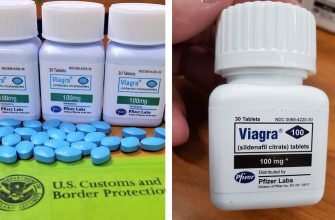Consider consulting your doctor about alternative treatments if you’ve used Viagra for over three months. Long-term use necessitates a thorough medical evaluation to assess potential risks and explore better-suited options for erectile dysfunction.
Regular checkups are paramount. These visits allow your physician to monitor your blood pressure, heart health, and overall well-being, crucial aspects when managing long-term medication use. They can also discuss any side effects you’re experiencing and adjust your treatment plan accordingly.
Phosphodiesterase-5 (PDE5) inhibitors, the class of drugs Viagra belongs to, can sometimes interact with other medications. Open communication with your doctor about all your prescriptions, over-the-counter drugs, and supplements is vital for preventing potentially harmful interactions. This transparency ensures your safety and efficacy of treatment.
Remember: This information is for educational purposes only and does not constitute medical advice. Always consult your healthcare provider for personalized guidance concerning your health and medication.
- Long-Term Viagra Use: A Comprehensive Guide
- Potential Long-Term Effects and Monitoring
- Alternative Treatments and Lifestyle Changes
- Medication Interactions and Safety
- Cost and Accessibility
- Understanding the Risks of Prolonged Viagra Intake
- Alternatives to Long-Term Viagra for Erectile Dysfunction
- When Long-Term Viagra Might Be Necessary: Specific Medical Cases
- Consulting Your Doctor: The Crucial First Step
Long-Term Viagra Use: A Comprehensive Guide
Consult your doctor before starting long-term Viagra use. Regular check-ups are crucial to monitor your health and adjust dosage if needed. This ensures the treatment remains safe and effective for you.
Potential Long-Term Effects and Monitoring
Prolonged Viagra use can sometimes lead to side effects like headaches, flushing, nasal congestion, or visual disturbances. Your physician will assess your risk factors and monitor you for these, adjusting treatment as necessary. They will also assess your cardiovascular health, as Viagra can interact with certain heart conditions. Regular blood pressure and cholesterol checks are recommended.
Alternative Treatments and Lifestyle Changes
Erectile dysfunction (ED) often has underlying causes. Lifestyle modifications, like diet and exercise improvements, weight management, stress reduction techniques, and smoking cessation, can positively impact ED. Your doctor might suggest these alongside or instead of medication. Other medications for ED exist, and your doctor can discuss alternatives suited to your individual needs and health profile.
Medication Interactions and Safety
Viagra interacts with certain medications, such as nitrates. Inform your doctor about all medications, supplements, and herbal remedies you take to avoid harmful interactions. Alcohol consumption should be moderated as it can exacerbate side effects. Follow your doctor’s instructions meticulously to minimize risks and maximize benefits.
Cost and Accessibility
The cost of long-term Viagra can be significant. Discuss cost-effective options with your doctor or pharmacist, including generic versions or exploring financial assistance programs that may be available in your area. They can help you navigate your healthcare options and access affordable treatment.
Understanding the Risks of Prolonged Viagra Intake
Don’t exceed the recommended dosage or frequency of Viagra. Prolonged use carries significant risks.
Cardiovascular Issues: Viagra increases blood flow, which can strain your heart, especially if you have pre-existing conditions like high blood pressure, heart disease, or angina. Consult your doctor before using Viagra if you have any heart problems.
- Increased risk of heart attack: Studies show a link between prolonged Viagra use and elevated risk of cardiovascular events.
- Stroke risk: Similar to heart attacks, prolonged use increases the likelihood of stroke.
- Irregular heartbeat: Viagra can disrupt your heart rhythm.
Vision Problems: Prolonged exposure to Viagra can cause rare but serious vision side effects, such as:
- Non-arteritic anterior ischemic optic neuropathy (NAION): This can lead to permanent vision loss.
- Sudden vision loss: Seek immediate medical attention if this occurs.
Hearing Problems: While less common than vision issues, prolonged use may increase the risk of hearing loss, including tinnitus (ringing in the ears).
Other Potential Side Effects: These can include headaches, flushing, nasal congestion, and indigestion. These effects usually diminish with time, but prolonged use may intensify or prolong them.
- Priapism: A prolonged and painful erection lasting more than four hours requires immediate medical attention, as it can cause permanent damage. This is a serious risk associated with high doses or prolonged usage.
- Medication Interactions: Viagra interacts negatively with certain medications, such as nitrates. Combining them can be life-threatening, causing a drastic drop in blood pressure. Always inform your doctor of all medications you’re taking.
Important Note: This information is not a substitute for professional medical advice. Always consult your physician before starting or continuing Viagra use, particularly for long-term treatment. They can assess your individual risk factors and determine the safest course of action.
Alternatives to Long-Term Viagra for Erectile Dysfunction
Consider lifestyle modifications. Regular exercise, a balanced diet, and weight management significantly improve erectile function. Aim for at least 150 minutes of moderate-intensity cardio per week. Focus on fruits, vegetables, lean proteins, and whole grains. Maintaining a healthy weight reduces cardiovascular risk factors that often contribute to ED.
Explore alternative medications. PDE5 inhibitors like tadalafil (Cialis) or avanafil (Stendra) offer different durations of action compared to Viagra, potentially reducing the need for daily use. Your doctor can help determine the best option for you based on your health profile and preferences. Additionally, medications addressing underlying conditions like high blood pressure or diabetes can indirectly improve erectile function.
Try vacuum erection devices (VEDs). These non-invasive devices create a vacuum around the penis, drawing blood in and producing an erection. They’re often used temporarily before sexual activity, providing a viable alternative for some men. Proper technique is vital to avoid injury.
Inquire about injection therapy. This involves injecting medication directly into the penis, causing vasodilation and facilitating an erection. While effective, it requires self-injection and carries potential side effects. Discuss the risks and benefits with your doctor before considering this option.
Consider penile implants. If other treatments prove ineffective, surgically implanted penile implants offer a permanent solution for erectile dysfunction. This is a more invasive procedure, requiring careful consideration of the risks and benefits. Your urologist can discuss suitability.
Consult your doctor. This information is for educational purposes only and does not replace professional medical advice. Proper diagnosis and personalized treatment plans are vital for managing erectile dysfunction successfully. Discuss your options with your healthcare provider to find the best approach for your individual needs.
When Long-Term Viagra Might Be Necessary: Specific Medical Cases
Long-term Viagra use should only be considered under strict medical supervision. It’s not a casual decision. Here are scenarios where it might be necessary:
Erectile Dysfunction (ED) due to Vascular Disease: For men with ED stemming from conditions like peripheral artery disease (PAD) or diabetes, Viagra can improve blood flow and address ED consistently. Regular use, closely monitored by a doctor, may be justified to maintain sexual function and overall well-being.
ED after Prostate Cancer Treatment: Radiation therapy or surgery for prostate cancer frequently causes nerve damage leading to ED. In these instances, sustained Viagra treatment can help men regain sexual function and maintain intimacy. Regular check-ups are vital to manage potential side effects and adjust dosage as needed.
Peyronie’s Disease: This condition involves the development of scar tissue in the penis, causing curvature and painful erections. While Viagra doesn’t cure Peyronie’s, it can facilitate penetration and improve sexual experience for some men, under careful medical guidance. Treatment should always address the underlying condition, too.
Hormonal Deficiencies: Low testosterone levels significantly contribute to ED. In such cases, Viagra might be prescribed alongside testosterone replacement therapy. This combined approach requires close monitoring of hormone levels and cardiovascular health. The goal is to optimize both testosterone levels and erectile function.
Important Note: Before starting long-term Viagra, a thorough medical evaluation is critical to rule out other underlying health issues and assess potential risks. Regular monitoring of blood pressure, heart health, and other relevant factors is crucial throughout treatment.
Consulting Your Doctor: The Crucial First Step
Schedule an appointment immediately. Don’t delay discussing long-term Viagra use with your physician. Openly share your medical history, including any existing conditions like heart problems, high blood pressure, or diabetes. This allows your doctor to assess potential risks and benefits accurately.
Be prepared to answer questions about your lifestyle. Smoking, alcohol consumption, and physical activity levels all impact your overall health and how your body responds to medication. Honest answers ensure personalized recommendations.
Discuss your erectile dysfunction symptoms in detail. This helps your doctor determine the underlying cause and explore various treatment options beyond Viagra. Alternatives might be more suitable for long-term use.
Expect a thorough physical examination. Your doctor might conduct blood tests to evaluate your overall health and check for potential drug interactions. This comprehensive approach is key to safe medication management.
Actively participate in the discussion. Ask questions about potential side effects, drug interactions, and long-term implications of Viagra. Understand the risks and benefits before making any decisions.
Follow your doctor’s instructions carefully. Adherence to prescribed dosages and monitoring for potential complications are fundamental to a successful treatment plan. Regular check-ups facilitate adjustments as needed.






